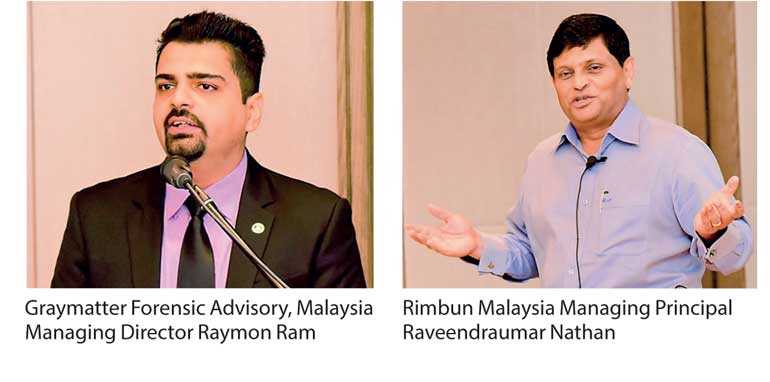Friday Feb 27, 2026
Friday Feb 27, 2026
Friday, 8 June 2018 00:00 - - {{hitsCtrl.values.hits}}

 The importance of fraud risk management is significantly highlighted globally due to the dynamic business environment with increased volumes of operations and complexity, leading towards greater vulnerability of risk. Therefore, the focus on mitigating such risk is essential to ensure that stakeholders are safeguarded by potential fraud affecting their respective organisations.
The importance of fraud risk management is significantly highlighted globally due to the dynamic business environment with increased volumes of operations and complexity, leading towards greater vulnerability of risk. Therefore, the focus on mitigating such risk is essential to ensure that stakeholders are safeguarded by potential fraud affecting their respective organisations.
In order to ensure the awareness and discuss upon the ‘Role of board of directors towards Fraud Risk Management’, a session was organised by Forestpin Ltd. on 25 May at Shangri-La Hotel Colombo, focusing on board directors from major companies within Sri Lanka.
The session was able to cover a broad spectrum of Fraud Risk Management ranging from understanding the basics of fraud, identifying the best practices towards combating fraud and analysing real life case studies for better understanding which enabled the participants to grasp the importance of the entire concept.
The program commenced with a networking session over breakfast leading towards a quiz where the participants focused on fraud case studies to obtain an initial understanding on different types of fraud, their scale of impact along with subsequent penalties. The participants also went in depth by analysing some financial record based questions to identify hidden potential human errors and fraud with the potential towards operational risk.
The main focus of the program was concentrated towards the lecture conducted by Rimbun Malaysia Managing Principal Dato’ Raveendraumar Nathan and Graymatter Forensic Advisory, Malaysia Managing Director Raymon Ram. The session was rich with content analysing the core basics of fraud and the entire spectrum related to managing fraud.
Fraud was identified as an intentional act or an omission which is designed to deceive external parties resulting in a victim suffering a loss or where the perpetrator achieves a gain. These occupational frauds where analysed upon the categorisation as Corruption, Asset Misappropriation and Financial Statement Fraud.
The 2018 Fraud statistics by Association of Fraud Examiners (ACFE) were discussed which revealed that 55% of the total fraud cases were relate to Asset Misappropriations. Even though the higher frequency of such cases it was identified that when the impact of fraud is analysed, Financial Statement Fraud even though with lesser frequency had the most impact. Through the intuition gained from actual statistics, measures to safeguard organisations were analysed which highlighted the role of the board of directors to provide governance oversight to safeguard interest of shareholders. Further managing fraud was identified as a continuous cyclic process focusing on detection, prevention and responding where immense responsibility was upon those in positions of authority making them the custodians of the wealth.
The session was of immense value and was an eye opener for the participants towards Fraud Risk Management which is of great importance although currently an area of minimal attention. The feedback from the participants highlighted the effectiveness of the session and their willingness and thoughts on the future such sessions which they were interested in the domains of fraud risk management.